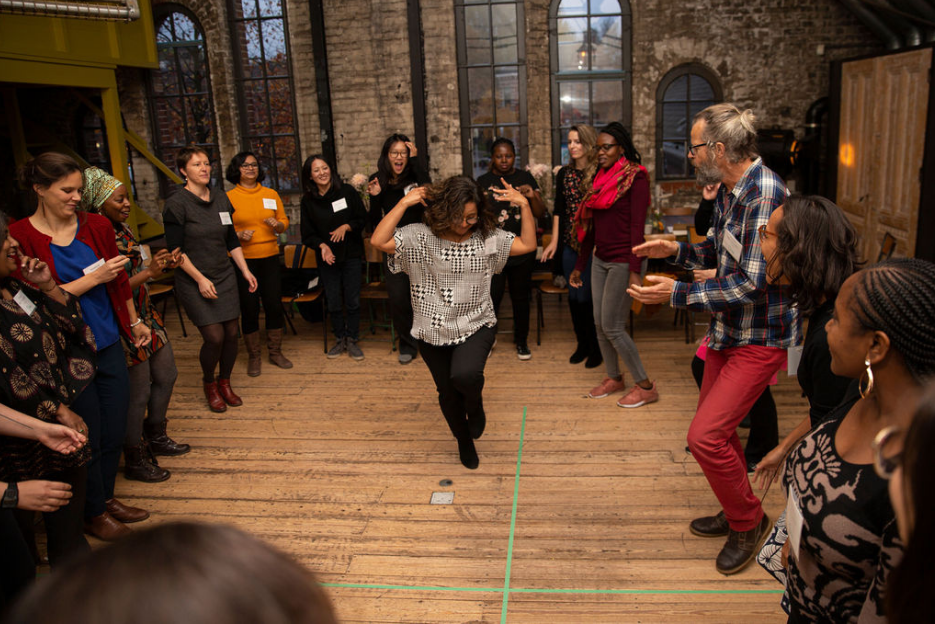Dealing with Doubt

Last month, our community of social justice leaders came together around something we don’t often talk about: doubting ourselves. Spring CEO and strategist Ellen Sprenger teamed up with feminist activist-storyteller Purity Kagwiria for an immersive conversation in February’s edition of our Leap of Leadership series.
Listen to the 25-minute audio recording of the conversation’s highlights and read on for some key strategies you can experiment with to flip the narrative on doubt so you can lead with confidence and compassion — for yourself and others.
Session Highlights
Doubting ourselves tends to be connected to imposter syndrome. It can be easy to look to others and think, “Wow, they’ve really got it together.” But if they’re human, even the fiercest leader has doubts, too — just like you. For others among us, doubt was something to keep a lid on because, as leaders in our organizations or communities, we felt compelled to model the confidence others needed to trust us.
But doubt isn’t all bad. Sure, we need to keep in check so that it doesn’t run wild and take over completely. When you dig deeper, there are healthy reasons to listen to that questioning voice.
As Ellen pointed out, doubt is simply one end of a polarity. On the other end is confidence. Neither is all good and neither is all bad; rather, there’s a balance to be had. “They each have a resourceful, generative, expression and an unresourceful, not-so-generative expression,” said Ellen. In other words, there are pros and cons to each extreme.

Ellen describes her journey as one from doubting the world around her, to righteousness and finally, being able to sit with her views and seek the perspectives of others. As a child, doubt about the way the world enforced binary gender roles and expression led her to question the way her community sought to change her. “My first relationship to doubt was one of questioning and of searching for alternatives.”
Later in life, as an activist, she was consumed by righteous anger and the confidence of knowing how the world was and how it should be. But … “I realized what was missing was heart,” she says. Ellen came to believe that to change something, you must love it fiercely. A drive to understand and connect with others, to listen and to make collective decisions became the compass she took into the next, current, chapter of her life.
Purity’s journey, on the other hand, has been a little different. It went from a natural confidence engaging with her community, to noticing a growing self-doubt to paving a better road for others. It started with an offhand comment from a trusted person about her laugh (was it too loud?). Newly self-conscious, she began to change the way she showed up in the world. She tried to smile less, laugh more modestly and “tone herself down.”
But that trend changed when she entered the feminist movement. “The feminist movement has this way of holding young people if you find the right people to hold you…We used to do these little exercises like reflecting on what you like about yourself, and people would share and say the things they like about you. And lots of people would mention my smile, my laughter. And I thought, wait a minute, this is the main thing! … I started to lose this memory that had brought so much doubt into my life.”
Feedback can be powerful — double-edged. On one hand, the smallest comment can change the course of our lives. On the other hand, support and appreciation can build us back up and put our lives on a more resilient, confident path.
Moving forward, Purity wants to challenge the way even philanthropic structures are set up to intimidate: with standard requirements for a demonstrated track record, years in operation, and more. “I really want to continually do better by the younger people who are coming after me, and for them to not have to fight the same battles I have fought…I want to be able to open more doors for young people to come as themselves as opposed to putting on a persona to be accepted by an ecosystem that was not even built for them anyway.”
Doubt is a pathway to questioning unequal systems and convincing others to join us as we build something better.
We're in a time of great uncertainty. How can we harness doubt as a strength and lead with confidence? We split into breakout groups to talk and share the wisdom of all the leaders in the session. Here are some key insights that emerged:
- Keep an eye on healing not just the symptoms of unhealthy doubt, but the root causes. One leader found that providing psychosocial spaces for staff can be a good tool. Maybe your doubt is telling you to need more or different resources/skills to succeed.
- Practice strong opinions, loosely held. Don’t stop having convictions; keep them near to your heart, but be willing to hear challenges to them and be open to their merit.
- Confidence enables us to fail forward. Don’t let doubt stop you from being afraid to fail or lose because you’ll miss out on a chance to learn something. As Purity noted, “If we're not learning we're missing out on some valuable things in life. We are boring.”
- More hierarchical forms of power are giving way to more distributed forms of power with a holistic view that values the whole person. In this context, being able to question the status quo and explore alternatives is a fundamental skill for collaborating with others.
- Remember the polarity. Does your current situation call for more exploration and perspective-taking or decisively doing what must be done?
Leap of Leadership is Spring’s monthly online meetup for social justice changemakers around the world. Each month, we tackle cutting-edge topics through new tools, concrete practices and exchanges with peers. Learn more or sign up to join our monthly drop-in sessions and receive our monthly emails.
March 8, 2022

